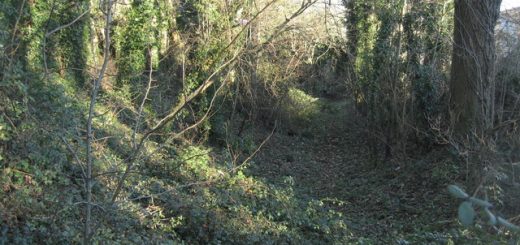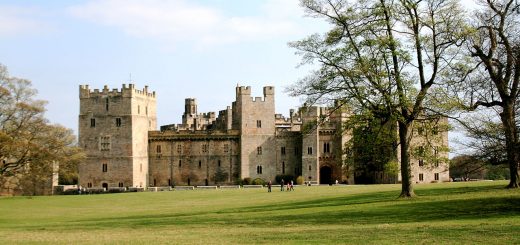Rushden Hall – haunted?
Rushden Hall and the thatched lodge near its main entrance must be the oldest extant domestic buildings in Rushden. The Hall itself dates from the 14th century and has benefitted from later additions during the Elizabethan and Jacobean periods through to more recent architectural add-ons.
Rushden Hall and the thatched lodge near its main entrance must be the oldest extant domestic buildings in Rushden. The Hall itself dates from the 14th century and has benefitted from later additions during the Elizabethan and Jacobean periods through to more recent architectural add-ons. The Hall is built from limestone with a clay tiled roof rather than with the Ironstone common in most parts of Northamptonshire. The Hall is topped with ‘Dutch’ gables from the 1600’s and fronted by well proportioned mullioned windows. During World War Two, US servicemen were billeted at the Hall and one of theimpacts was that a grand avenue of mature trees was cut down to allow military vehicles to access the grounds. The Hall suffered neglect in the post-war period when Rushden Hall was left empty and unoccupied for years apart from homing the resident ’Park Keeper’ in charge of the grounds and the former Band Stand. At one stage demolition of Rushden Hall was mooted. Fortunately the local council annexed the Hall for extra office space and halted the decline of its structure.
During the Edwardian period Rushden Hall was a family home for the wealthy ‘Sartoris’ family but was also a place of employment for my maternal grandmother Mary Desborough from the nearby village of Wymington. After leaving school Mary was employed as a maid at Rushden Hall, a traditional form of work service for the daughters of local families and deemed preferable to working in the local shoe factories or at the farm. That period of service for the then owners of Rushden Hall came to a close when Mary was married.
The reason that Mary had told me the details of that time at Rushden Hall was that one of her routine tasks as a maid included attending to the upstairs rooms of Rushden Hall. The rooms in the Hall were heated by open fireplaces and upstairs on the east front was one single room that always had an uncomfortable ‘atmosphere’. Mary and the other domestic staff were reluctant to enter that one upstairs room in question as it was allegedly haunted.
A prime manifestation of the alleged ‘haunting’ was that even on the hottest summer days that one particular room (but none other in the Hall) would have an icy chill. On crossing the threshold into the ‘haunted’ room there could often be an instantaneous and marked drop in air temperature accompanied by a perception of ‘being watched’. To try to solve the ‘issue’ of the icy atmosphere there was a fireplace in the room and she was ‘instructed to ensure that the fire was always lit’. However no amount of fuel burned in its fireplace could ever lift the ‘chill’ or lighten the perceived gloom of that one upper room.
Mary was a level headed country girl and had rationalised the possible causes such as cracked windows causing draughts (apparently there were none) or the defects of an ancient building (the roof of the hall was sound at that time) but along with other domestic staff at the Hall, she had not been alone in being convinced that when the rest of the Hall basked in sweltering high summer weather, that the rapid temperature drops felt on entering that one single room at the Hall was an odd occurrence. Certainly it stayed in her memory to the extent that half a century later she had recounted it as the ‘haunted room’.
The only story I have been able to find about any of the rooms at the Hall is one that dates from the 19th century concerning one “Mr Fletcher, apparently a typical Georgian squire who was standing warming himself before a fireplace and the gunpowder horn in his pocket ignited blowing out all the windows but leaving him unharmed”. The room where that incident allegedly occurred is now called ‘The Fletcher Room’. Rushden Hall was also the fictional home of the anti-heroine in the H.E.Bates novel ‘Love for Lydia’. In recent times I have attended parties and wedding receptions on the ground floor at the Hall accessible to the public with prior permission of the council, and have always found Rushden Hall to be a welcoming place with a long and interesting history.
I wonder if any council workers whose offices are upstairs at the Hall have noticed that one room in particular, cannot be kept warm in winter, nor not need any air conditioning even in the height of summer?




Re: Rushden Hall – haunted?
Great write up Prusakowski. I’ll keep my eyes out for anything relating to Rushden Hall.